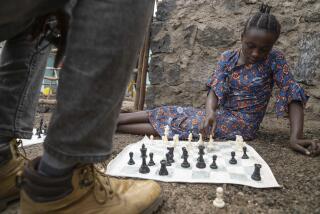Director of the Boards
- Share via
SANTA ANA — Moving from board to board, 14-year-old Justin Sheek won all but one of 32 simultaneous games of chess Friday during an unusual challenge that pitted the young champ against a local chess club.
Making the rounds between two rows of tables at MacArthur Intermediate School, Sheek moved his pieces with lightning speed, barely taking time to contemplate his strategy before moving on to the next opponent.
Behind each chess board was a member of MacArthur’s chess club, which had requested the visit as a way for both club members and Sheek to improve their games.
For Sheek, the reigning ninth-grade U.S. champion from Long Beach, the challenge was to top his previous record of 15 wins in 15 simultaneous games. For students, it was an opportunity to learn from one of the best.
In the end, nearly everyone walked away with a better knowledge of chess, while Sheek also received a lesson in time management.
“Don’t play 32 people in two hours,” he said. “It’s tough.”
Sheek’s visit to MacArthur was arranged by school chess club advisor Bob Edwards.
Edwards, who also teaches social studies, said that this year’s club is unusually large--35 members--and especially bright. He said he was looking for outside help because he has taught them everything he knows.
“I can’t help them any more than I have,” explained Edwards. “I’m an amateur. They’re already beating me.”
Edwards said he first contacted Robert M. Snyder, Sheek’s mentor. Snyder runs a private Huntington Beach chess club for youngsters and regularly hosts school assemblies to teach children about the game.
The chess club paid Snyder $130 for Friday’s 45-minute seminar--money that Snyder returned to the club in the form of two scholarships to his private academy.
Snyder also arranged for Sheek to challenge every member of the chess club in school that day in simultaneous games.
Club members sat facing each other in two rows of 15 each. The last two players rotated in after the first two club players lost.
As Sheek moved quickly down the lines, his opponents were left with a couple of minutes to contemplate their next moves.
While some students spent the downtime comparing strategies, others took advantage of the break.
“He [Sheek] can sit here two seconds and decide a big move,” said Kari Strichart, 13. “I have to take two minutes.”
About 50 minutes into the games, Scott Bradfield, 14, became one of the first casualties.
“He [Sheek] beat me pretty fast,” Bradfield said. “He doesn’t take any time to think about it.”
Bradfield said that at the outset, he thought he might win.
Still, when Sheek uttered, “Checkmate,” Bradfield said, “it was kind of embarrassing.”
After two hours, Snyder asked the students who were too far behind to ever win to call it quits and shake hands with Sheek.
As the 2 1/2-hour mark approached, all but one of the chess sets had been cleared, and the students hovered over Sheek and Joshua Kim, 12.
Kim checkmated Sheek, but was humble in victory.
“I didn’t really do it,” he said. Sheek “just messed up.”
Sheek, in defeat, was equally humble.
“He deserved to win,” Sheek said.
More to Read
Sign up for Essential California
The most important California stories and recommendations in your inbox every morning.
You may occasionally receive promotional content from the Los Angeles Times.













